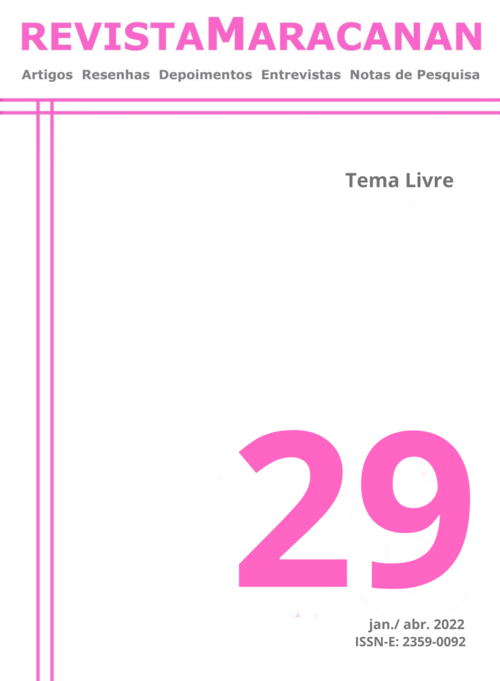O ideal do “Eu branco” e as memórias germinadas no quilombo de São José da Serra: uma análise da memória nacional e a constituição psíquica da pessoa negra
DOI:
https://doi.org/10.12957/revmar.2022.63109Palavras-chave:
Memória Nacional, Ideal do Eu, Comunidades QuilombolasResumo
O presente artigo analisa as produções de uma memória nacional, suas implicações histórias e contribuições para a constituição psíquica de um Ideal do Eu branco na pessoa negra. Para compor esse estudo, foram analisadas as narrativas de Chimamanda Adichie, escritora nigeriana e Antônio Nascimento Fernandes, membro da comunidade do Quilombo São José da Serra (RJ). Através de uma perspectiva de um passado vivo que fecunda o presente, questionamos a afirmação de Walter Benjamin, sobre a vitória constante de um inimigo. Conclui-se que resistências negras sempre estiveram presentes no campo social e político, sendo suas memórias germinadas no presente e futuro, o que impossibilita o decreto determinista de um vencedor.
Downloads
Referências
ASCOM. Lançamento para Edital: criação de novo logotipo e logomarca da FCP. Palmares, Fundação Cultural. Publicado em: 17 ago. 2021. Disponível em: http://www.palmares.gov.br/?p=58727. Acesso em: 11 out. 2021.
BENJAMIN, Walter. Magia e técnica, arte e política: ensaios sobre literatura e história da cultura. São Paulo: Brasiliense, 1987.
BENJAMIN, Walter. O anjo da história. Belo Horizonte: Autêntica, 2012.
CARONE, Iray. Breve histórico de uma pesquisa psicossocial sobre a questão racial brasileira. In: CARONE, Iray; BENTO, Maria Aparecida Silva. Psicologia Social do racismo: estudos sobre branquitude e branqueamento no Brasil. Petrópolis, RJ: Vozes, 2016.
COIMBRA, Cecília. Operação Rio: O mito das classes perigosas. Um estudo sobre violência urbana, a mídia impressa e os discursos de segurança pública. Rio de Janeiro; Niterói, RJ: Oficina do Autor; Intertexto, 2001.
COSTA, Jurandir. Da cor ao corpo: a violência do racismo. In: Violência e Psicanálise. São Paulo: Zagodoni, 2021.
DEFENSORIA Pública Geral do Estado do Ceará. Invisível: prazer, uma pessoa sem registro civil. Defensoria Pública Geral do Estado do Ceará. (Site). Publicado em: 4 jun. 2021. Disponível em: https://www.defensoria.ce.def.br/noticia/invisivel-prazer-uma-pessoa-sem-registro-civil/. Acesso em: 11 out. 2021.
FANON, Frantz. Pele negra, máscaras brancas. Salvador: EDUFBA, 2008.
FOUCAULT, Michel. Verdade e poder. In: Microfísica do poder. Rio de Janeiro: Paz e Terra, 2014.
FREUD, Sigmund. Introdução ao narcisismo. São Paulo: Companhia das Letras, 2010.
FREUD, Sigmund. Novas conferências introdutórias à psicanálise. [1932-1936]. In: O mal-estar na civilização, novas conferências introdutórias e outros textos (1930-1936). São Paulo: Companhia das Letras, 2010.
GOMES, Nilma Lino. O movimento negro brasileiro como ator político. In: O movimento negro educador. Petrópolis, RJ: Vozes, 2019.
HALBWACHS, Maurice. Memória coletiva. São Paulo: Centauro, 2006.
IBGE. Instituto Brasileiro de Geografia e Estatística. Desigualdades sociais por cor ou raça no Brasil. Vol. 41. Rio de Janeiro: IBGE, 2019. Disponível em: https://biblioteca.ibge.gov.br/index.php/biblioteca-catalogo?view=detalhes&id=2101681. Acesso em: 10 out. 2021.
LOBO, Lilia Ferreira. Corpo cativo e corpo assujeitado: as marcas da deficiência. In: Os infames da história: pobres, escravos e deficientes no Brasil. Rio de Janeiro: Lamparina, 2015.
MUNANGA, Kabengele. Rediscutindo a mestiçagem no Brasil: identidade nacional versus identidade negra. Belo Horizonte: Autêntica, 2019.
NASCIMENTO, Beatriz. Nossa democracia racial. In: Uma história feita por mãos negras: relações raciais, quilombos e movimentos. Rio de Janeiro: Zahar, 2021.
NORA, Pierre. Entre memória e história: a problemática dos lugares. Projeto História, São Paulo, n. 10, p. 07-28, 1993.
PINTO, Walber. Se é crime inafiançável, por que é tão difícil punir o racismo com rigor no Brasil? CUT. (Site). Publicado em: 5 ago. 2021. Disponível em: https://www.cut.org.br/noticias/se-e-crime-inafiancavel-por-que-e-tao-dificil-punir-o-racismo-com-rigor-no-brasi-9ec8. Acesso em: 11 out. 2021.
POLLAK, Michael. Memória e identidade social. Estudos Históricos, Rio de Janeiro, v. 5, n. 10, p. 200-212, 1992.
RIOS, Ana Lugão; MATTOS, Hebe. Memórias do cativeiro: família, trabalho e cidadania no pós-abolição. Rio de Janeiro: Civilização Brasileira, 2005.
SANTOS, André. Rastros de resistência: histórias de luta e liberdade do povo negro. São Paulo: Panda Books, 2020.
SIRELLI. Nilda. O trabalho de luto e a potência do esquecimento. 2014. Tese (Doutorado em Memória Social) – Universidade Federal do Estado do Rio de Janeiro, Rio de Janeiro. Disponível em: http://www.memoriasocial.pro.br/documentos/Teses/Tese43.pdf. Acesso em: 22 out. 2021.
SOUZA, Neusa Santos. Tornar-se negro: as vicissitudes da identidade do negro brasileiro em ascensão social. Rio de Janeiro: Graal, 1983.
VIEIRA, Leandro. Mangueira 2019: História para ninar gente grande. Mangueira. (Site). Publicado em: 2019. Disponível em: http://www.mangueira.com.br/noticia-detalhada/993. Acesso em: 2 set. 2019.
Downloads
Publicado
Como Citar
Edição
Seção
Licença
Os autores mantêm os direitos autorais e concedem à Revista Maracanan o direito de publicação, sob uma Licença Creative Commons Atribuição 4.0 Internacional, a qual permite que outros distribuam, remixem, adaptem e criem a partir do seu trabalho, mesmo para fins comerciais, desde que lhe atribuam o devido crédito pela criação original.
Os dados e conceitos abordados são da exclusiva responsabilidade do autor.
A Revista Maracanan está licenciada com uma Licença Creative Commons Atribuição 4.0 Internacional.





